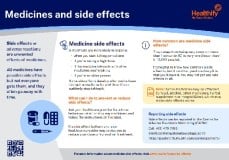You can now add Healthify as a preferred source on Google. Click here to see us when you search Google.
Itraconazole
Sounds like 'eye-tra-kon-ah-zole'
Key points about itraconazole
- Itraconazole is an antifungal medicine used to treat infections caused by fungi.
- Itraconazole is also called Itrazole®.
- Find out how to take it safely and the possible side effects.

Itraconazole is an antifungal medicine used to treat fungal and yeast (a type of fungus) infections. It works by stopping the growth of fungi that cause infections.
It’s used to treat fungal infections of the toenail or fingernail (called onychomycosis), or fungal infections of the skin or scalp (called tinea skin infections). It can also be used to treat vaginal thrush or oral thrush.
Itraconazole is also called Itrazole®. It’s available on a prescription written by a prescriber.
In Aotearoa New Zealand, itraconazole is available as capsules (100 mg) and oral liquid (10 mg in 1 mL).
- Always take your itraconazole exactly as your healthcare provider has told you. The pharmacy label on your medicine will tell you how much itraconazole to take, how often to take it, and any special instructions.
- The dose of itraconazole will be different depending on the type of infection being treated, how severe the infection is and your age.
- The usual dose for adults is 1 or 2 capsules, to be taken 1 or 2 times a day.
- The dose for children will depend on their body weight.
- Your healthcare provider will advise you on how long to take itraconazole for. It may be prescribed as a 1-day treatment or taken for up to a few months.
- Timing: Take itraconazole at the same time/s each day.
- If you're taking itraconazole twice a day, then space the doses out by taking one of the doses in the morning and the other dose in the evening.
- If you're taking itraconazole on a schedule other than every day (eg, 1 week every month), it may help to mark your calendar with a reminder. You might find a medication reminder app helpful.
- Food: Take itraconazole capsules with or immediately after food. Itraconazole liquid is best taken on an empty stomach.
- Capsules: Swallow the capsules whole with a drink of water. Don’t open or chew them.
- Liquid itraconazole: Shake the bottle well and use an oral syringe or measuring spoon to measure each dose. Take liquid itraconzole at least 1 hour before meals or wait until 2 hours afterwards. Swish the liquid around your mouth before swallowing and don’t rinse your mouth afterwards.
- Missed dose: If you forget to take your dose, take it as soon as you remember that day. But, if it's nearly time for your next dose, just take the next dose at the right time. Don't take double the dose.
- Finish the course: It’s best to take the whole course for the number of days your healthcare provider has told you to. If you don’t feel better or get more unwell, contact your healthcare provider. Don't stop taking it, even if you feel your infection has cleared up.
- Driving: Be careful when driving or using tools until you know how this medicine affects you.
- Alcohol: Itraconazole can make you feel dizzy. Limit or avoid drinking alcohol while taking itraconazole as alcohol may increase these side-effects.
- Other medicines: Itraconazole interacts with some medicines (such as calcium channel blockers), herbal supplements and rongoā Māori, so check with your healthcare provider before starting itraconazole and before starting any new products.
- Indigestion medicines, iron or calcium: If you also take indigestion remedies, iron or calcium, take them at least 2 hours before or after you take your itraconazole.
- Grapefruit, grapefruit juice or sour/Seville oranges: Avoid grapefruit, grapefruit juice or foods containing grapefruit while taking itraconazole. It can increase your chance of side effects. Read more about grapefruit and medicines.
- The effects of itraconazole aren’t always immediate: It may take several months after you finish treatment to see the full benefit of itraconazole. When used to treat nail infections, it takes time for your new healthy nails to grow out and replace the infected nails.
- Pregnancy or breastfeeding: Talk to your healthcare provider if you're pregnant, planning a pregnancy or want to breastfeed.
- Monitoring: If you're taking itraconazole for longer than one month you will have blood tests to check how well your liver is working.
Like all medicines, itraconazole can cause side effects, although not everyone gets them. If you're concerned about any symptoms you think might be related to your medicine, talk to your healthcare provider. The following information offers some guidance but doesn't include all possible side effects.
Common side effects
Tell your healthcare provider if these side effects bother you.
- Headache.
- Nausea (feeling sick), sore tummy, vomiting (being sick), changes in taste.
- Diarrhoea (runny poo) or constipation.
- Feeling dizzy.
Tell your healthcare provider immediately or phone Healthline free on 0800 611 116 if these occur
- Signs of problems with your heart such as trouble breathing, sudden weight gain, swelling ankles or feet or feeling very tired.
- Signs of problems with your liver such as yellowing of the skin or eyes, dark urine, pain in the abdomen.
- Signs of problems with your red blood cells such as infection (fever, sore throat) or unusual bruising or bleeding.
Phone 111 for an ambulance or go to your nearest accident and emergency (A&E) clinic if these occur
-
Signs of an allergic reaction such as itchy skin, and rash, swollen lips or tongue, problems breathing, like a tight chest or shortness of breath.
Read more about medicines and side effects and reporting a reaction you think might be a side effect.
The following links have more information on itraconazole.
Itraconazole(external link) New Zealand Formulary Patient Information
Itrazole(external link) Medsafe Consumer Information Sheet, NZ
Brochures
Medicines and side effects(external link) Healthify He Puna Waiora, NZ, 2024
5 questions to ask about your medications(external link) Health Quality and Safety Commission, NZ, 2019 English(external link), te reo Māori(external link)
References
- Itraconazole (external link)New Zealand Formulary
- Triazole antifungals(external link) New Zealand Formulary
- Itraconazole(external link) New Zealand Formulary for children
- Itrazole (external link)Medsafe datasheet, NZ
Brochures

Medicines and side effects
Healthify He Puna Waiora, NZ, 2024

Health Quality and Safety Commission, NZ, 2019 English, te reo Māori
Credits: Healthify editorial team. Healthify is brought to you by Health Navigator Charitable Trust.
Reviewed by: Stephanie Yee, Pharmacist, Auckland.
Last reviewed:





